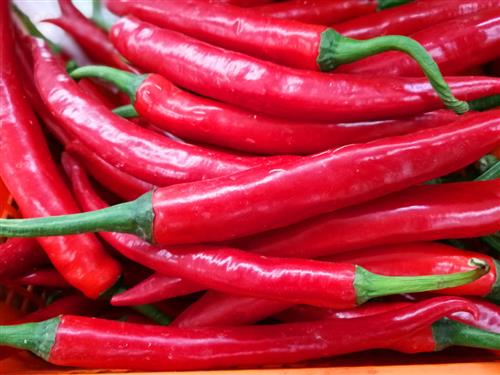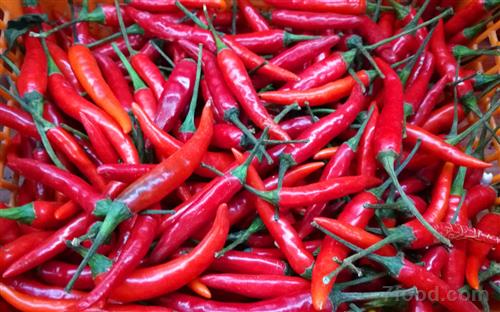Pepper is the most common food in the daily diet. It contains an unusually rich variety of vitamins. Vitamin A, B vitamins, vitamin C, vitamin E, vitamin K, and folic acid, trace elements, and dietary fiber are found in a pepper. . Eating chili can increase appetite, enhance physical strength, and improve symptoms such as cold, frostbite and vascular headache. So what's the benefit of eating chili regularly? Who should not eat chili? The benefits of eating chili Appetizers Pepper has a stimulating effect on the oral cavity and gastrointestinal tract. It can enhance gastrointestinal motility, promote secretion of digestive juice, improve appetite, and inhibit abnormal fermentation in the intestine. Beauty beauty Pepper can promote hormone secretion and improve skin condition. Many people think that eating spicy food will cause acne. It is actually not a problem with hot peppers. Only the physique that loves pimple itself will only burn the oil after eating chili. Lipid-lowering diet Capsaicin in pepper can accelerate the decomposition of fat, which has the effect of losing weight. At the same time, because pepper is rich in dietary fiber, the effect of reducing blood lipids is also obvious, and it has a certain anti-cancer effect. Pepper contains a component that can stimulate the body's heat system by dilating blood vessels, effectively burning body fat, speeding up metabolism, and speeding up the body's caloric consumption, thereby achieving weight loss. Promote blood circulation "Medicinal test" said that pepper can "warm and cold, in addition to the wind and sweat, to cold heading, phlegm, dampness." Chinese medicine believes that spicy food can not only promote blood circulation, improve cold, frostbite, vascular headache, but also It can increase the activity of brain cells, help to delay aging and relieve various diseases. Cold warm stomach "Food Materia Medica," said the peppers "eliminate accommodation, dissipate gas, appetite the door, open up evil, and kill larvae." Because of the cold, cold, vomiting, and diarrhea can be eaten properly. Pain relief Pepper Xin Wen, can reduce body temperature by sweating and relieve muscle pain, so it has a strong antipyretic and analgesic effect. The United States found that capsaicin in pepper can reduce the transmission of painful neurotransmitters, making people feel less painful. Improve immunity Eating spicy food properly in the cold winter can also promote the synthesis of collagen in the body, prevent the rupture of capillaries, and improve the body's immune function. prevent cancer Carotenoids in vegetables such as peppers and carrots stimulate genes that transmit information between cells. As the organs become cancerous, the system for exchanging messages between cells can malfunction, which may have important functions in cancer prevention. Prevention of atherosclerosis A red pepper contains our daily required beta-carotene, a powerful antioxidant that can counteract the oxidation of low-density cholesterol (LDL) to harmful forms. Once the LDL is oxidized, like a cream that does not fit into the refrigerator, it becomes a bad substance that blocks the arteries. In other words, beta carotene begins to intervene at the initial stage of atherosclerosis. Prevention of gallstones Eating green peppers can prevent gallstones. Green pepper is rich in vitamins, especially vitamin C, can be replaced by excess cholesterol in the body into bile acids, thereby preventing gallstones, those who have gallstones eat more vitamin C-rich green peppers, to alleviate the disease has a certain effect. Red apple red peppers prevent breast cancer - Researchers recently discovered that "red skin" fruits and vegetables such as red apples and red pepper have preventive and therapeutic effects on breast cancer and other cancer diseases. Prevent colds Spicy foods have the "three links" that are good for the lungs, accessibility, and smoothness of blood. Who should not eat chili 1, suffering from cardiovascular and cerebrovascular diseases, hypertension should not eat chili, chronic bronchitis, pulmonary heart disease, pulmonary tuberculosis patients is no exception. Due to capsaicin will make excessive secretion of digestive juice, causing gastrointestinal mucosal hyperemia, edema, increased gastrointestinal motility, can cause gastritis, enteritis, diarrhea, vomiting, but also not conducive to the recovery of digestive function. At the same time, capsaicin increases circulating blood volume, accelerates heartbeat, and tachycardia. Taking it in large quantities in the short term can cause acute heart failure and sudden cardiac death. Even if no accident happens, it will hinder the existing cardiovascular and cerebrovascular diseases and lung lesions. Rehabilitation. 2, patients with chronic gastritis, gastric ulcer, esophagitis, due to the stimulation of capsaicin, mucosal congestion, edema, erosion, gastrointestinal motility increased dramatically, causing abdominal pain, diarrhea, etc., also affect the recovery of digestive function. 3, suffering from chronic cholecystitis, cholelithiasis, chronic pancreatitis patients, due to the stimulation of capsaicin, causing increased gastric acid secretion, gastric acid can cause gallbladder contraction, bile duct sphincter spasm, causing bile discharge difficulties, thereby inducing cholecystitis, Biliary colic and pancreatitis. 4, patients with acne, due to the stimulation of capsaicin, phlegm congestion and edema, can increase acne, and even the formation of anal abscess. In addition, peppers can increase constipation and make acne heavy. 5, patients suffering from red eye disease, keratitis do not eat chili, from the perspective of traditional Chinese medicine, the taste of chili is hot, easy to get angry and aggravate the condition. 6, maternal, pregnant women should not eat chili, not only can appear mouth sores, dry stools, but also because of breast-feeding infants make it sick; if women with leucorrhea increased, pregnant women with genital itching can increase consumption of pepper. 7. People with kidney disease should not eat chili peppers, like spicy foods like peppers and various kinds of spicy condiments (such as onion, ginger, garlic, curry, mustard, and pepper), as well as various spices and vegetables containing more volatile oil ( Such as leeks, fennel, celery, radish, etc., in the human metabolic process, its spicy ingredients are often excreted through the kidneys, and these spicy ingredients on the renal parenchymal cells have varying degrees of stimulation, in severe cases will affect the function of the kidney . 8, dermatitis and some skin diseases are unfit for human consumption, often aggravate the condition after eating. 9. Patients who are taking Chinese medicine to treat diseases are also listed as taboos, because consumption of capsaicin will affect the efficacy. Even normal people should not eat chili for a long time. According to the relevant data, among the patients with esophageal cancer and gastric cancer, people who have long-term consumption of pepper occupy a considerable proportion. In summary, although the spicy food is delicious, it should be enough. Medical Disposable Swabs,Sterile Transport Swabs,Medical Sterile Swabs,Disposable Sterile Swabs Yancheng Rongtai Labware Co.,Ltd , https://www.shtestlab.com
